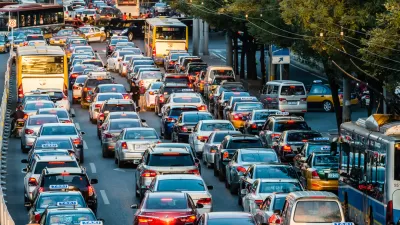I occasionally have speculated that our aging society would lead to increased transit ridership, as seniors lost the ability to drive. But I recently discovered that seniors are actually less likely to use public transit than the general public. One study by the American Public Transit Association showed that 6.7% of transit riders are over 65 (as opposed to 12.4% of all Americans).(1) The oldest Americans are even more underrepresented on America's buses and trains: only 1.5% of transit riders are over 80, about half their share of the population (2). The only other age group that is underrepresented on public transit is Americans under 18.
I occasionally have speculated that our aging society would lead to increased transit ridership, as seniors lost the ability to drive. But I recently discovered that seniors are actually less likely to use public transit than the general public. One study by the American Public Transit Association showed that 6.7% of transit riders are over 65 (as opposed to 12.4% of all Americans).(1) The oldest Americans are even more underrepresented on America's buses and trains: only 1.5% of transit riders are over 80, about half their share of the population (2). The only other age group that is underrepresented on public transit is Americans under 18.
Why might older Americans be more car-dependent than younger Americans? It could be argued that older Americans are "locked into" car-dependent sprawl, having bought houses many years ago. But 55-64 year olds are probably just as "locked in" to their houses, but according to APTA's on-board survey of transit riders are actually slightly more likely to use transit than the general population (though less so than 20- and 30- somethings).(3) So this explanation is unlikely to be the best one.
A more likely reason is that older Americans are less likely to work, giving them less incentive to travel generally. But why aren't retirees who do travel abandoning driving for transit in large numbers?
Now that I have a not-very-mobile 89-year-old father, I can suggest one possible explanation: if your body is sufficiently troubled that you can't drive, it is often sufficiently troubled that you can't walk very far (or very safely, given the high level of harm from falls), which in turn keeps you from walking to a bus.
(1)http://www.apta.com/resources/statistics/Documents/transit_passenger_ch… (page 37).
(2) Id. at 38.
(3) Id. at 37. However, the evidence as to this age group is more ambiguous; a national household survey showed that 41-60 year olds were slightly underrepresented on transit, though less so than seniors. Id. at 38.

Maui's Vacation Rental Debate Turns Ugly
Verbal attacks, misinformation campaigns and fistfights plague a high-stakes debate to convert thousands of vacation rentals into long-term housing.

Planetizen Federal Action Tracker
A weekly monitor of how Trump’s orders and actions are impacting planners and planning in America.

In Urban Planning, AI Prompting Could be the New Design Thinking
Creativity has long been key to great urban design. What if we see AI as our new creative partner?

King County Supportive Housing Program Offers Hope for Unhoused Residents
The county is taking a ‘Housing First’ approach that prioritizes getting people into housing, then offering wraparound supportive services.

Researchers Use AI to Get Clearer Picture of US Housing
Analysts are using artificial intelligence to supercharge their research by allowing them to comb through data faster. Though these AI tools can be error prone, they save time and housing researchers are optimistic about the future.

Making Shared Micromobility More Inclusive
Cities and shared mobility system operators can do more to include people with disabilities in planning and operations, per a new report.
Urban Design for Planners 1: Software Tools
This six-course series explores essential urban design concepts using open source software and equips planners with the tools they need to participate fully in the urban design process.
Planning for Universal Design
Learn the tools for implementing Universal Design in planning regulations.
planning NEXT
Appalachian Highlands Housing Partners
Mpact (founded as Rail~Volution)
City of Camden Redevelopment Agency
City of Astoria
City of Portland
City of Laramie






























